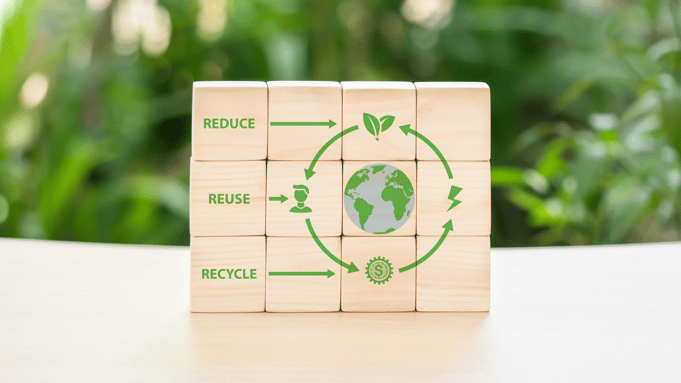A monomaterial is formed when the packaging is made of the same material as the label. So, remember – if the labelling material differs from the component, the packaging might not be recyclable. As a consequence, this threatens the circular economy.
The more the world can recycle plastic packaging, the more the circular economy will grow. Monomaterials significantly increase the possibility of packaging being sorted correctly and thus recycled. In other words, they are a big part of sustainable packaging and labelling in a circular economy.
Sustainable packaging design is essential for the circular economy
According to The Ellen MacArthur Foundation, a circular economy entails that we need to stress the way products are designed in the first place:
"We must transform every element of our take-make-waste system: how we manage resources, how we make and use products, and what we do with the materials afterwards."
This also implies that for companies geared towards a circular business model, further advancements within monomaterials and sorting automation will be necessary.
Read more: Do you have a sustainable plan for your packaging and labelling?
The HolyGrail Project
An increasing number of global sorting plants are going from manual to automatic sorting, which means it's vital that they detect the correct recycling materials.
The HolyGrail project aims to improve automated recognition and sorting by testing the labelling of various packaging with visible and invisible codes. It can streamline sorting by reading codes and further increasing the recycling rate.
The codes on the labels may contain information such as plastic type, product manufacturer, product type, and type of barrier layer. This way, the packaging can store vital information throughout the product’s value chain until the life cycle of the packaging is clarified.
During part two of the project, Procter & Gamble tested the labelling of selected products in collaboration with Tomra, Germany. Here at Skanem Africa, we are excited to follow the global developments as an associated member of the HolyGrail project to provide you with more sustainable labels and packaging.
Read more: A guide for choosing cost-efficient and sustainable label materials
Recycling efforts in Kenya
According to The UN, Kenya is emerging as a leader in the fight against plastic pollution. It is among the first countries in East Africa to limit single-use plastics and sign the Clean Seas initiative to rid waterways of plastic waste.
In 2019, The Kenya Association of Manufacturers (KAM) released a Plastic Action Plan with a Proposed National Recycling Target of 30% by 2030. The baseline of 2020 was marked as 9%.
In June 2021, The Kenya Extended Producer Responsibility Organization (KEPRO) was launched to promote collaboration, seek commitment from waste value chain players, and support achieving a circular economy. The organization, established by KAM, brings together players in the value chain to help increase awareness and promote sustainable capacity building in Kenya's recycling and circular economy.
 |
| Credits: KEPRO |
Our industry has enormous potential and a responsibility to contribute to a circular economy. For this reason, we are focused on mapping innovative solutions.
Read more: Eco-Friendly and sustainability trends within packaging and labelling for 2023
As a label manufacturer based out of Kenya, here at Skanem Africa we know how vital continuous innovation is for our clients, and it's something we take very seriously. If you have any inquiries about sustainable packaging, feel free to contact us.




